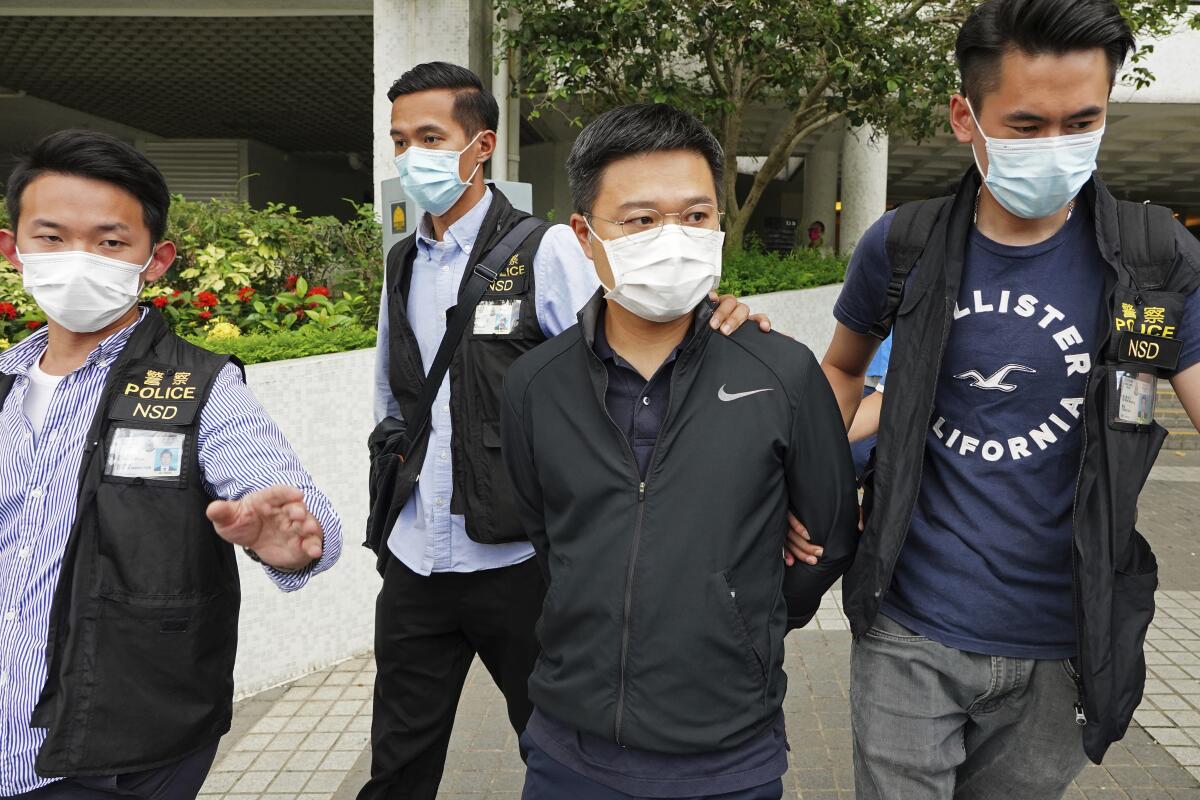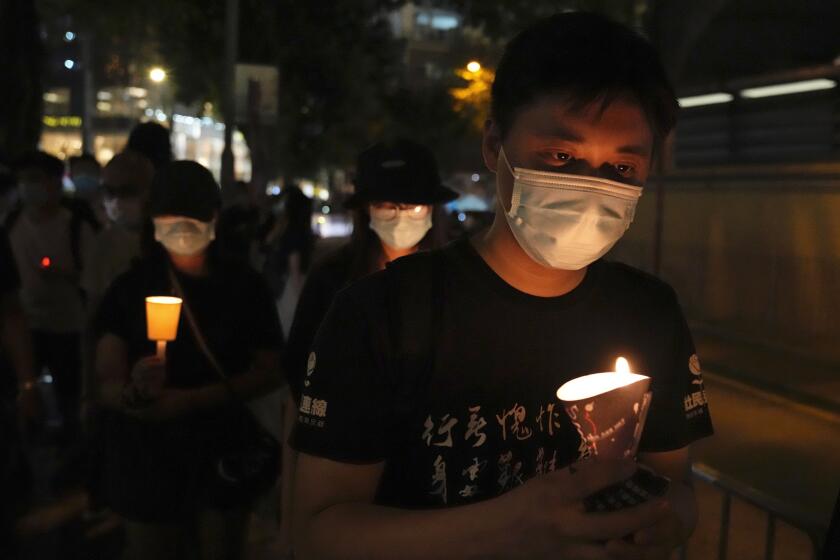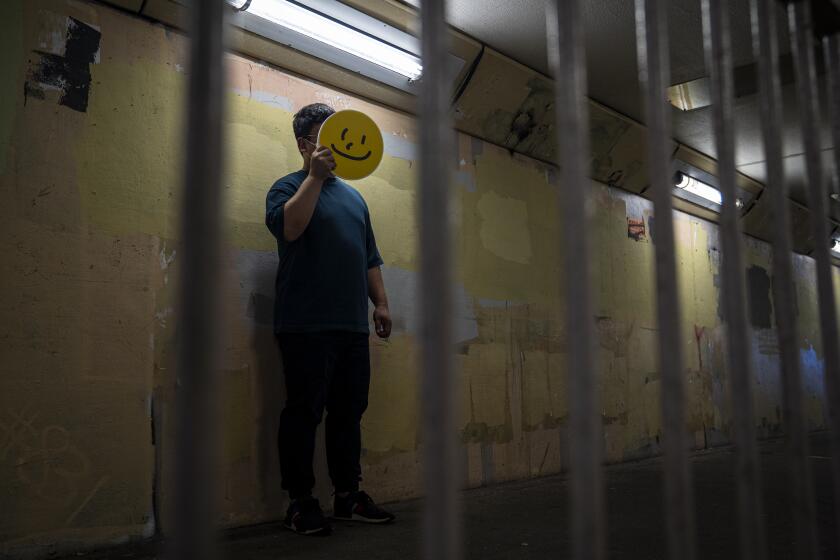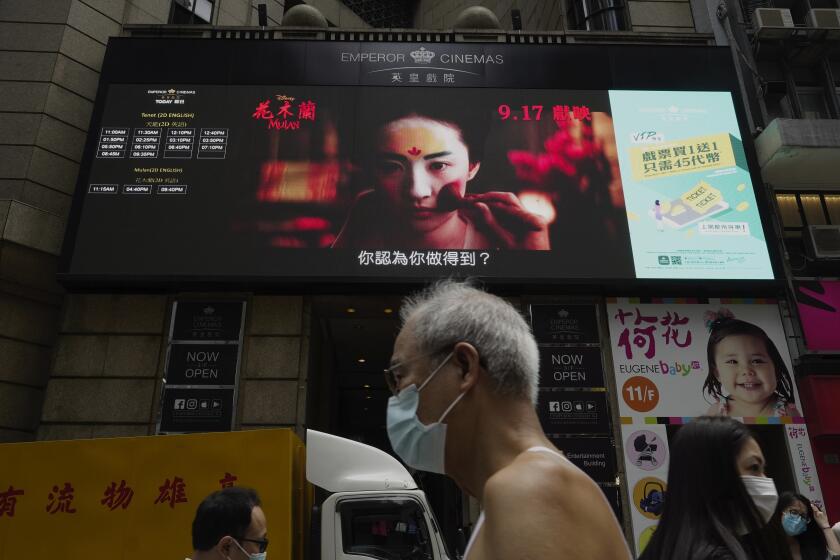Editors of pro-democracy newspaper arrested under Hong Kong security law

HONG KONG — Hong Kong authorities Thursday used a sweeping national security law against a pro-democracy newspaper for the first time, arresting five editors and executives on charges of collusion with foreign powers.
Police said they had evidence that more than 30 articles published by Apple Daily played a “crucial part” in a conspiracy with foreign countries to impose sanctions on China and Hong Kong in response to a crackdown on civil liberties in the semi-autonomous Chinese city.
Apple Daily said in a statement that the move left it “speechless” but vowed to continue its reporting. The newspaper has long been one of the most outspoken defenders of Hong Kong’s freedoms and in recent years has often criticized the Chinese and Hong Kong governments for tightening control over the city and walking back on Beijing’s promises that the city could retain its freedoms for 50 years when it was handed back to Chinese control from Britain in 1997.
The newspaper has thus found itself a frequent target by authorities. Apple Daily founder Jimmy Lai is currently serving a 20-month prison sentence for his role in unauthorized assemblies in 2019, during a period when Hong Kong saw massive anti-government protest calling for universal suffrage and democratic freedoms.
Police also froze $2.3 million worth of assets belonging to three companies linked to Apple Daily, said Li Kwai-wah, a senior superintendent at Hong Kong’s National Security Department.
Those arrested included Apple Daily’s chief editor, Ryan Law; Cheung Kim-hung, Next Digital’s CEO; the publisher’s chief operating officer; and two other editors, the newspaper said.
Hundreds of people gather in Hong Kong despite a ban on an annual vigil remembering China’s crackdown on pro-democracy protesters in Tiananmen Square.
More than 200 police officers were involved in a search of Apple Daily’s offices. The Hong Kong government said a warrant was obtained to look for evidence of a suspected violation of the national security law.
Apple Daily published a letter to its readers, saying that police had confiscated many items during the search, including 38 computers that contained “considerable” journalistic material.
“Today’s Hong Kong feels unfamiliar and leaves us speechless. It feels as though we are powerless to stop the regime from exercising its power as it pleases,” the letter said. “Nevertheless, the staff of Apple Daily is standing firm. We will continue to persist as Hongkongers and live up to the expectations so that we have no regrets to our readers and the times we are in.”
Hong Kong Security Minister John Lee told a news conference that police would investigate people in the Apple Daily companies and others to establish if they assisted in instigating or funding the alleged offenses.
China’s ‘purification’ of classrooms: A new law erases history, silences teachers and rewrites books
China’s crackdown on Hong Kong is purging teachers, rewriting textbooks and increasing pressure on schools over what to put in the minds of students. A new national security law has endangered freedom of thought and expression.
He said that the police action against the Apple Daily editors and executives was not related to “normal journalistic work.”
“The action targeted the use of journalistic work as a tool to endanger national security,” he said, warning people to keep distance from those who are under investigation because they are not “normal journalists.”
He said that anyone who engaged in journalistic work in Hong Kong must abide by the law, including the national security legislation.
“You should not collude with these perpetrators, do not be in cahoots with them. Otherwise, you will pay a hefty price,” Lee told reporters. “Distance yourself from them. Otherwise, all you are left with are regrets.”
Hong Kong censors can now ban films deemed a danger to national security, prompting concerns in a city once known for its vibrant arts and film scene.
Chris Yeung, chairman of the Hong Kong Journalists Assn., said in an online news conference that the arrests and raid on Apple Daily could create a chilling effect on society. He raised concerns about the use of the national security law as a “weapon to prosecute media executives and journalists for publishing reports and articles that are deemed as a threat to national security.”
He said that the court warrant that allowed police to search the offices of Apple Daily had undermined journalists’ ability to protect their sources and materials, which is vital to press freedom.
“Self-censorship will get worse if journalists are not sure whether they are able to protect their sources of information,” said Yeung. “We urge the government to give more details of the case as soon as possible to allay fears about freedom of the press and freedom of expression.”
The national security legislation imposed by Beijing last summer outlaws secession, subversion, terrorism and collusion with foreign powers. The law has been used to arrest more than 100 pro-democracy activists and has silenced many opposition voices in the city. Others have fled abroad.
Start your day right
Sign up for Essential California for the L.A. Times biggest news, features and recommendations in your inbox six days a week.
You may occasionally receive promotional content from the Los Angeles Times.
In response, the U.S. has imposed sanctions on Hong Kong and Chinese officials, including the city’s leader, Carrie Lam, accusing them of undermining Hong Kong’s autonomy.
The Chinese government’s liaison office in Hong Kong said in a statement Thursday that it supported police action in enforcing the law and maintaining national security in Hong Kong.
It said that while the city’s mini-constitution, the Basic Law, guarantees freedom of speech and press, those rights cannot break through the “bottom line of national security.”
“Everyone is equal before the law. There is no exception, including media organizations,” the liaison office said. “Freedom of the press is not a ‘shield’ for illegal activities.”
More to Read
Sign up for Essential California
The most important California stories and recommendations in your inbox every morning.
You may occasionally receive promotional content from the Los Angeles Times.













